For my partner Liisa (Vasu dha)
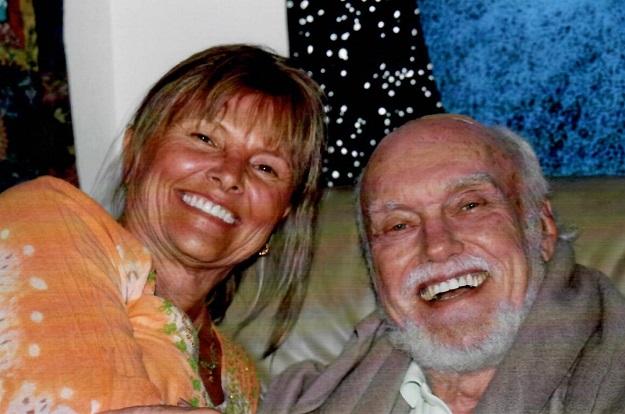
Liisa’s Seven Part Video Series on her 40-year relationship to Ram Dass
Memories, Reflections, and Teachings
A Tribute to Ram Dass
The Book
Be Here Now
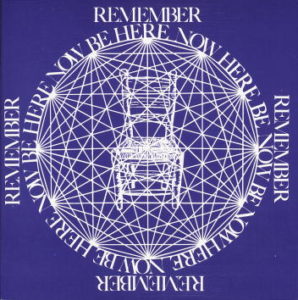
Chapter 1
JOURNEY
(The Transformation: Dr. Richard Alpert, Ph.D. Into Baba Ram Dass)
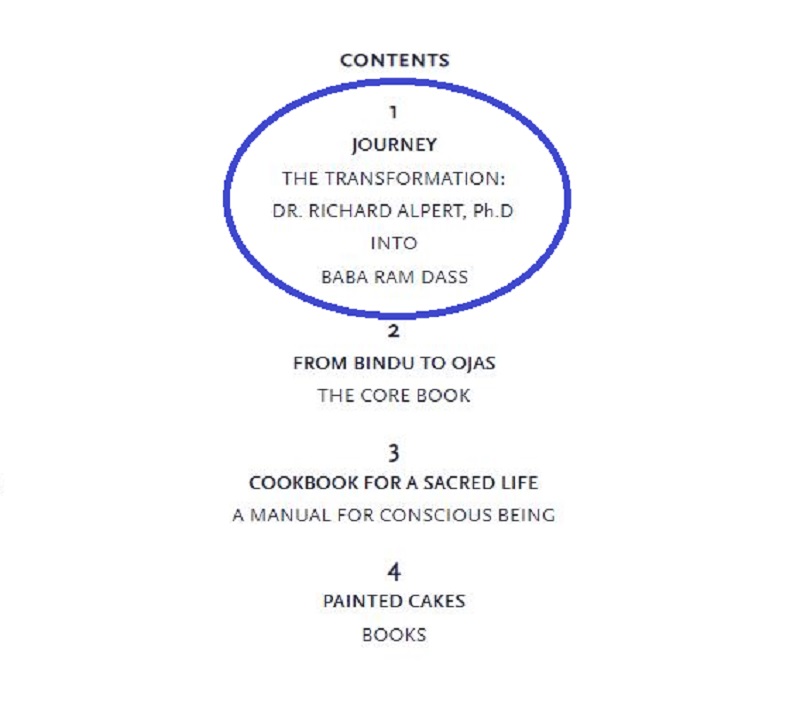
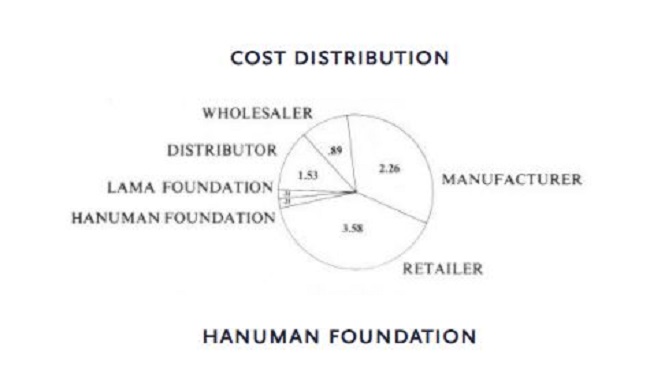
Introduction
MONEY YOGA
The three cost pies shown on the previous page show where the green energy would go for each of three proposed retail prices for this book. We have chosen a price of $3.33 trading off our desire to provide this book at lowest possible cost against our need to help sustain the work of the Lama Foundation.
Our share of the green energy will be used for similar publishing endeavors, for the continued development of our center in New Mexico, for the right livelihood of resident members and students at the Foundation, and for work on the Path here and abroad guided by Baba Ram Dass.
The operating and sustenance costs of our center in New Mexico are met by a $2/day room and board fee paid by each student and resident member. In the absence of right livelihood at the center, this green energy must come from elsewhere. Our construction, development, and school costs have so far been met by moneyed generosity, on which the Foundation’s existence has depended.
We incorporated in the spring of 1968 as a non-profit foundation with the sole purpose of serving as an instrument for the awakening of consciousness. Guided by the premise that “The essence of spirituality is practicality,” we are attempting to develop our bodies, minds, and hearts in an integrative way.
We don’t fully understand the relationship between the energy formed here and the green energy that flows through us. Practicality suggests that we here should work toward economic self-sufficiency by means of publishing and of “cottage industries” such as woodworking, pottery, printing, and textiles. Toward this we are working.
Yours in the Dharma,
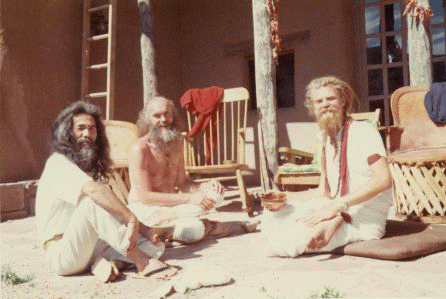
The Lama Foundation
OUR-STORY
There are three stages in this journey that I have been on! The first. The social science stage; the second, the psychedelic stage; and the third, the yogi stage. They are summating — that is, each is contributing to the next. It’s like the unfolding of a lotus flower. Now, as I look back, 1 realize that many of the experiences that made little sense to me at the time they occurred, were prerequisites for what was to come later. I want to share with you the parts of the Internal Journey that never get written up in the mass media. I’m not interested in the political parts of the story: I’m not interested in what you read in the Saturday Evening Post about LSD. This is the story of what goes on inside a human being who is undergoing all these experiences.
SUCCESS
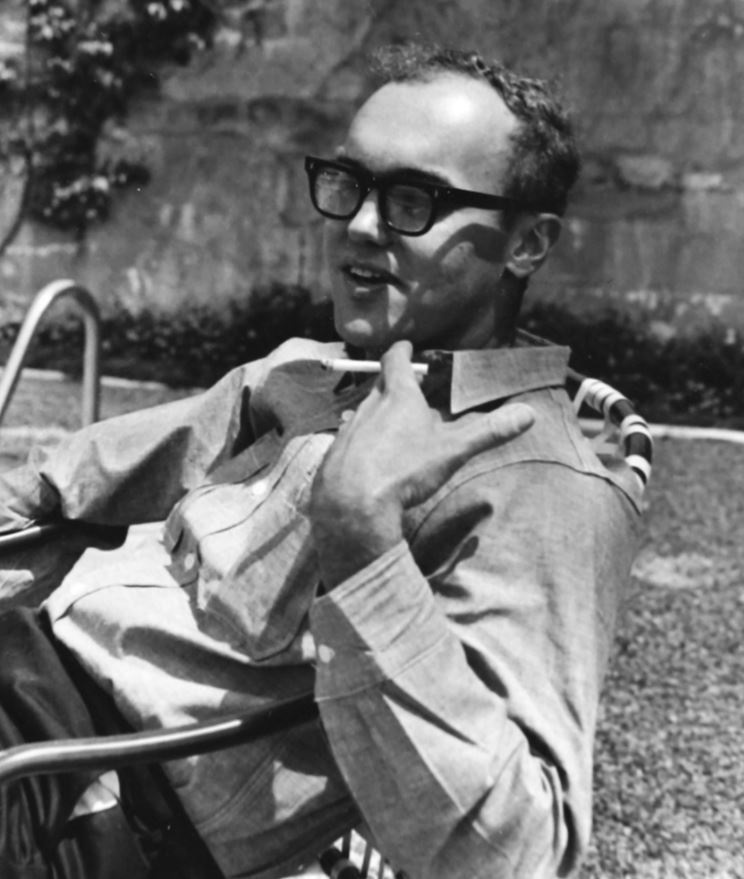
In 1961, the beginning of March, I was at perhaps the highest point of my academic career. I had just returned from being a visiting professor at the University of California at Berkeley. I had been assured of a permanent post that was being held for me at Harvard, if I got my publications in order. I held appointments in four departments at Harvard — the Social Relations Department, the Psychology Department, the Graduate School of Education, and the Health Service (where I was a therapist); I had research contracts with Yale and Stanford. In a worldly sense, I was making a great income and I was a collector of possessions.
I had an apartment in Cambridge that was filled with antiques and I gave very charming dinner parties. I had a Mercedes-Benz sedan and a Triumph 500 CC motorcycle and a Cessna 172 airplane and an MG sports car and a sailboat and a bicycle. I vacationed in the Caribbean where I did scuba-diving. I was living the way a successful bachelor professor is supposed to live in the American world of “he who makes it.” I wasn’t a genuine scholar, but I had gone through the whole academic trip. I had gotten my Ph.D.; I was writing books. I had research contracts. I taught courses in Human Motivation, Freudian Theory, Child Development. But what all this boils down to is that I was really a very good game player.
My lecture notes were the ideas of other men, subtly presented, and my research was all within the Zeitgeist — all that which one was supposed to research about.
In 1955 I had started doing therapy and my first therapy patient had turned me on to pot. I had not smoked regularly after that, but only sporadically, and I was still quite a heavy drinker. But this first patient had friends and they had friends and all of them became my patients. I became a “hip” therapist, for the hip community at Stanford. When I’d go to the parties, they’d all say “here comes the shrink” and I would sit in the corner looking superior. In addition, I had psychoanalysis at a cool investment of something like $26,000.
Before March 6th, which was the day I took Psylocybin, one of the psychedelics, I felt something was wrong in my world, but I couldn’t label it in any way so as to get hold of it. I felt that the theories I was teaching in psychology didn’t make it, that the psychologists didn’t really have a grasp of the human condition, and that the theories I was teaching, which were theories of achievement and anxiety and defense mechanisms and so on, weren’t getting to the crux of the matter.
My colleagues and I were 9 to 5 psychologists: we came to work every day and we did our psychology, just like you would do insurance or auto mechanics, and then at 5 we went home and were just as neurotic as we were before we went to work. Somehow, it seemed to me, if all of this theory were right, it should play more intimately into my own life. I understood the requirement of being “objective” for a scientist, but this is a most naive concept in social sciences as we are finding out. And whatever the psychoanalysis did (and it did many things, I’m sure) I still was a neurotic at the end of those five years of psychoanalysis. Even my therapist thought so, because when I stopped analysis to go to Harvard, he said, “You are too sick to leave analysis.” Those were his final words. But because I had been trained in Freudian theory, I knew his game well enough to enjoy this terribly sophisticated, competitive relationship with my analyst, and I would say to him, “Well in Freud’s 1906 paper, don’t you recall he said this, and when I’m saying this you should be interpreting …” For this I was paying $20 an hour!
Something was wrong. And the something wrong was that I just didn’t know, though I kept feeling all along the way that somebody else must know even though I didn’t. The nature of life was a mystery to me. All the stuff I was teaching was just like little molecular bits of stuff but they didn’t add up to a feeling anything like wisdom. I was just getting more and more knowledgeable. And I was getting very good at bouncing three knowledge balls at once. I could sit in a doctoral exam, ask very sophisticated questions and look terribly wise. It was a hustle.
DISSATISFACTION
Now my predicament as a social scientist was that I was not basically a scholar. I came out of a Jewish anxiety-ridden high-achieving tradition. Though I had been through five years of psychoanalysis, still, every time I lectured, I would get extraordinary diarrhea and tension. Lecturing five days a week made it quite a complex problem to keep my stomach operating. But whatever my motivations, they drove me so hard that despite the fact that I was a very mediocre student (in fact, I could never get into Harvard no matter how hard I tried, even using all my father’s political influence) I finally found myself on the faculty of the “good” universities.
I could study 10 hours and prepare a really good lecture on Freud or Human Motivation, but it was all as if it were behind a wall. It was theoretical. I theorized this or that. I espoused these ideas, these intellectual concepts, quite apart from my own experiential base. Although I could bring all kinds of emotional zeal to bear on my presentation, there was a lack of validity in my guts about what I was doing. And, to my suppressed dismay, I found that this stance was considered acceptable by most of my colleagues who seemed, in their attempt to become “scientific”, to think of personality in terms of variables. Children were nothing but ambulatory variables, and no matter how hard we tried, by the time we got to the legitimacy of a highly operationally-defined variable. it had lost its gut feeling. So the concepts we were working with were intellectual fun and games, but they weren’t affecting my life.
Here I was, sitting with the boys of the first team in cognitive psychology, personality psychology, developmental psychology, and in the midst of this I felt here were men and women who, themselves were not highly evolved beings. Their own lives were not fulfilled. There was not enough human beauty, human fulfillment, human contentment. I worked hard and the keys to the kingdom were handed to me. I was being promised all of it. I had felt I had got into whatever the inner circle meant: I could be Program Chairman for Division 7 of the A.P.A. and I could be on government committees, and have grants, and travel about and sit on doctorate committees. But there was still that horrible awareness that I didn’t know something or other which made it all fall together. And there was a slight panic in me that I was going to spend the next forty years not knowing, and that apparently that was par for the course. And in off hours, we played “Go”, or poker, and cracked old jokes. The whole thing was too empty. It was not honest enough.
And there was some point as a professor at Stanford and Harvard when I experienced being caught in some kind of a meaningless game in which the students were exquisite at playing the role of students and the faculty were exquisite at playing the role of faculty. I would get up and say what I had read In books and they’d all write it down and give it back as answers on exams but nothing was happening. I felt as if I were in a sound-proof room. Not enough was happening that mattered — that was real.
And as a therapist I felt caught in the drama of my own theories. The research data showed that Rogerian patients ended up saying positive statements, and Freudian patients ended up talking about their mother because of subtle reinforcement clues — it was so obvious. I would sit with my little notebook and when the person would start talking about his mother, I’d make a note and it didn’t take long for the patient to realize that he got his “note” taken, he got his pellet, every time he said certain things. And pretty soon he would be “Freudianized.”
In the face of this feeling of malaise, I ate more, collected more possessions, collected more appoints and positions and status, more sexual and alcoholic orgies, and more wildness in my life.
Every time I went to a family gathering, I was the boy who made it. I was a Professor at Harvard and everybody stood around in awe and listened to my every word, and all I felt was that horror that I knew inside that I didn’t know. Of course, it was all such beautiful, gentle horror, because there was so much reward involved.
I had an empire in a placed called Center for Research in Personality: a corner office in a building I’d helped design; with two secretaries and many graduate and undergraduate research assistants. I had done all this in about three years. I was really driven. Until you know a good, Jewish middleclass, upwardly mobile, anxiety-ridden neurotic, you haven’t met a real achiever!
My Judaism was a political Judaism. I came out of a tradition of folk religion — the spirit escaped me somehow, although we did all the Yom Kippur and Passover Services. But Dad was on the Board of Trustees that hired and fired Rabbis, so how could I get into a feeling with a spiritual leader if my father was hiring and firing these guys.
Down the hall from my big empire, there was a little office. It had been a closet and they needed an extra office, so they cleared out the closet and put a desk in there and in that closet was Timothy Leary. He had been bicycling around Italy, bouncing checks, and David McClelland found him and brought him back as a creative gift to western science. Tim and I became drinking buddies together. Then we started to teach courses together, such as the first year clinical course — practicum — on “Existential Transactional Behavior Change.”
The more time I spent with Tim, the more I realized he had an absolutely extraordinary intellect. He really knew a lot. I found him extremely stimulating and the students found him exciting to be around, because of his openness to new ideas and his willingness to take wild risks in thinking.
One night when we were drinking together, we plotted a trip across North and South America, and when I said I flew a plane, he said, “Great, we’ll fly in your plane.”
And I said, “Wonderful,” and neglected to tell him that I had only a student license.
So I secretly set about getting a license in order to meet him on August 1st in Cuernavaca, Mexico, where he was summering. There we would start our journey.
At the time I was a consultant for a School Mathematics Study Group, a mathematics program in Education at Stanford. I got my license and an airplane on the same day and flew to Mexico the next day in a death-defying leap. When I got there, I found that Timothy had done some other type of flying, just about the week before. Frank Baron, who was a psychologist at Cal, an old friend of Tim’s, had introduced him to anthropologist in Mexico and they had come to know about the Tionanactyl, the flesh of the Gods, the Magic Mushrooms of Mexico, which one obtained from Crazy Juanna, a woman up in the mountains who ate the mushrooms all the time. Contact was made with her and the mushrooms were obtained.
Tim had eaten nine of these mushrooms — so many male and so many female mushrooms — with a group of others around a swimming pool and had had a profound experience. He said, “I learned more in the six or seven hours of this experience than I had learned in all my years as a psychologist.”
That is a strong statement!
When I arrived in Cuernavaca, the mushrooms were all gone, and so was the zeal to go on a trip across South America, because what was the sense in doing external journeying when obviously what Timothy had been looking for was inside his own head.
So I hung out in Tepetzlan with David McClelland and his family and in Cuernavaca with Tim and his entourage, and then flew back to the United States with Tim and Jackie his son, and an Iguana.
And I went to be a visiting professor at Cal and Tim went back to Harvard. And by the time I got back, Timothy had a large psychedelic project going.
He had consulted with Aldous Huxley, who was then visiting at M.I.T., and Aldous and Tim and a number of graduate students had contacted Sandoz, who produced a synthetic of the magic mushrooms called Psylocybin, and they had gotten a test batch of this and were busy taking it and administering it. When I got back to Cambridge in the spring, I was invited to share in this bounty.
TURNING ON
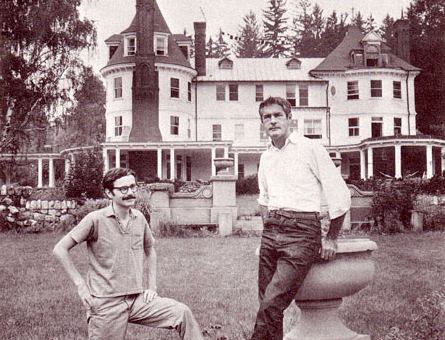
The night that was chosen turned out to be the night of the biggest snowstorm of the year and it was to be at Tim’s home in Newton, a few blocks from the home of my parents where I had been visiting for dinner. I plowed through the snow, came in and we sat around the kitchen table and there were about three or four of us and we passed the bottle of pills and I took my 10 milligrams. That was my preparation and my set and setting, but beyond that I trusted Timothy. I had seen that Timothy had had a profound experience and he was somebody with an intellect that I understood. I knew that he was not interpersonally destructive — he might be destructive of institutions, but not of individuals. He was a very loving person.
We took a very small dosage, (later we were using 5 or 10 times as much) and the first part of the experience was comparable to a strong pot-high, I’d say. A little more dramatic, a little more intense. Clearly though something happened.
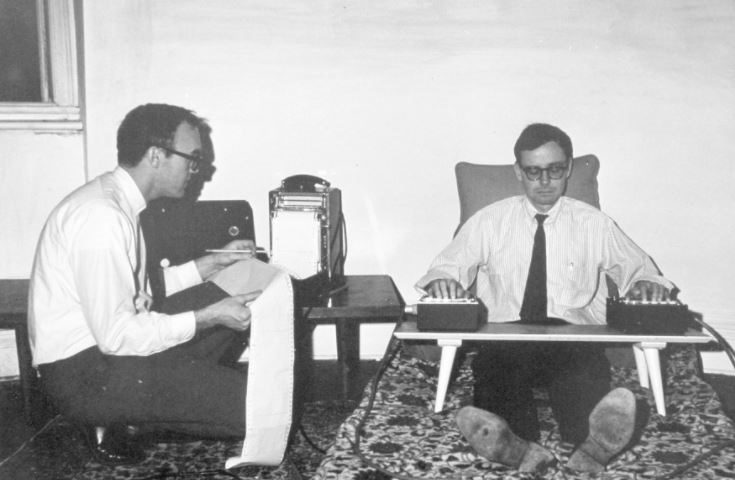
During the first part of this experience with Psylocybin, we got into a very low-level tragi-comedy type thing. Tim’s son’s dog had been running in the snow and upon entering the warm kitchen lay gasping and panting. To our timeless minds, his struggle for breath continued too long and we thought he was about to expire. What could we do? We could hardly carry the dog through a blizzard in the early Sunday morning to the vet’s some four miles away, especially since we were all very high, and thus not sure about the dog’s state. It seemed our concerned mounted and the dog passed into a nearby room where it appeared to collapse. We finally decided the only path was to summon 11-year old Jackie from the Late TV show upstairs. Since he wasn’t under a chemical influence, we would watch his interaction with the dog, rather than frighten him with our own suspicions.
Jackie was not pleased at being disturbed by us, (merely to find out what he was watching on TV), but the problem was quickly solved by the dog, who, upon hearing Jackie’s voice, leapt back to life, ready to play.
Now a few hours later I had gone off by myself to reflect upon these new feelings and senses. A deep calm pervaded my being. The rug crawled and the pictures smiled, all of which delighted me. Then I saw a figure standing about 8 feet away, where a moment before there had been none. I peered into the semi-darkness and recognized none other than myself, in cap and gown and hood, as a professor. It was as if that part of me, which was Harvard professor, had separated or disassociated itself from me.
“How interesting … an external hallucination,” I thought. “Well, I worked hard to get that status but I don’t really need it.” Again I settled back into the cushions, separate now from my professorness, but at that moment the figure changed. Again I leaned forward straining to see. “Ah, me again.” But now it was that aspect of me who was a social cosmopolite. “Okay, so that goes too,” I thought. Again and again the figure changed and I recognized over there all the different aspects I knew to be me … cellist, pilot, lover, and so on. With each new presentation, I again and again reassured myself that I didn’t need that anyway.
Then I saw the figure become that in mc which was Richard Alpert-ness, that is, my basic identity that had always been Richard. I associated the name with myself and my parents called me Richard: “Richard, you’re a bad boy.” So Richard has badness. Then “Richard, aren’t you beautiful!” Then Richard has beauty. Thus develop all these aspects of self.
Sweat broke out on my forehead. I wasn’t at all sure I could do without being Richard Alpert. Did that mean I’d have amnesia? Was that what this drug was going to do to me? Would it be permanent’? Should I call Tim! Oh, what the hell so I’ll give up being Richard Alpert. I can always get a new social identity. At least I have my body … But I spoke too soon.
As I looked down at my legs for reassurance, I could see nothing below the kneecaps, and slowly, now to my horror, I saw the progressive disappearance of limbs and then torso, until all I could see with my eyes open was the couch on which I had sat. A scream formed in my throat. I felt that I must be dying since there was nothing in my universe that led me to believe in life after leaving the body.
Doing without professorness or loverness, or even Richard Alpertness, okay, but I did NEED the body.
The panic mounted, adrenalin shot through my system — my mouth became dry, but along with this, a voice sounded inside — inside what, I don’t know — an intimate voice asked very quietly, and rather jocularly, it seemed to me, considering how distraught I was, “… but who’s minding the store?”
When I could finally focus on the question, I realized that although everything by which I knew myself, even my body and this life itself, was gone, still I was fully aware! Not only that, but this aware “I” was watching the entire drama, including the panic, with calm compassion.
Instantly, with this recognition, I felt a new kind of calmness — one of a profundity never experienced before. I had just found that “I”, that scanning device — that point — that essence –that place beyond. A place where “I” existed independent of social and physical identity. That which was I was beyond Life and Death. And something else — that “I” Knew — it really Knew. It was wise, rather than just knowledgeable. It was a voice inside that spoke truth. I recognized it, was one with it, and felt as if my entire life of looking to the outside world for reassurance — David Reisman’s other-directed being, was over. Now I need only look within to that place where I Knew.
Fear had turned to exaltation. I ran out into the snow laughing as the huge flakes swirled about me. In a moment the house was lost from view, but it was all right because inside I Knew.
Around 5 in the morning I walked back, plowing through the snow to my parents’ home, and I thought, “Wouldn’t it be nice; I’ll shove the walk — young tribal buck shovels the walk.” So 1 started to shovel the walk and my parents’ faces appeared at the upstairs window.
“Come to bed, you idiot. Nobody shovels snow at 5 in the morning.”
And I looked up at them and I heard the external voice I had been listening to for 30 years, and inside me something said, “It’s all right to shovel snow and it’s all right to be happy.”
And I looked up at them and I laughed and did a jig and went back to shoveling snow. And they closed the windows and then I looked up and inside they were smiling too. That was my first experience of giving a contact high!
But also, you can see in that moment in the early morning the seeds of the breakaway. The seeds of the ability to be able to confront, and even disagree with, an existing institution and know and trust that inside place that says it’s all right. It’s something I could never have done without anxiety until that moment — until that day.
Now I thought at that moment, “Wow, I’ve got it made. I’m just a new beautiful being — I’m just an inner self — all I’ll ever need to do is look inside and I’ll know what to do and I can always trust it, and here I’ll be forever.”
But two or three days later I was talking about the whole thing in the past tense. I was talking about how I “experienced” this thing, because I was back being that anxiety-neurotic, in a slightly milder form, but still, my old personality was sneaking back up on me.
Well. the next day I had to give my lecture in Social Relations 143, Human Motivation, and it presented me with a bit of a problem because I couldn’t find anywhere in the psychology teachings anything about what had happened to me the night before.
Now, what we did at first at Harvard was to tell all of our colleagues about this extraordinary thing that was happening to us, and they all shared our delight, as any scientists do when a fellow scientist finds a new avenue into the unknown. And so the first week they listened with delight, And then at the end of the first week we all went back into our experimental cell — the living room by the fire and opened the bottle again and took some more psylocybin to chart this course further. And the next week we had shared a deeper experience and we came back and we spoke to our colleagues. Now they couldn’t hear us quite as well. It wasn’t that they were changing, it was that we were. We were developing a language among ourselves. If Admiral Byrd and an exploratory party are going deeper and deeper into the polar region, the things they think about and are concerned about and are interested in become less and less relevant to somebody living in New York City. This was our situation.
We had the choice along the way of stopping to bring everybody else along, or going on. But these experiences quickly became indescribable. I’d get to a point with my colleagues when I couldn’t explain any further, because it came down to “To him who has had the experience no explanation is necessary, to him who has not, none is possible.” And we would feel this frustration when they’d say “It sounds very interesting.” And we’d say, “In order to know, you’ve got to try it.” And they’d say, “No, that isn’t scientific. It isn’t appropriate to test your own product. You do it first on animals and then on graduate students …”
So then the next week, we’d sit around on Saturday night and say, “What should we do?” and we all knew what we were going to do, and we would “turn on.” We were exploring this inner realm of consciousness that we had been theorizing about all these years and suddenly we were traveling in and through and around it. At the same time, of course, by the second week, it was as though we had just been traveling in Tibet, and now, back in the school lunchroom, who do we hang out with? We hang out with the guy with whom we went to Tibet, because we shared this very powerful experience.
Pretty soon there were five or six of us and we were hanging out together and our colleagues said, “Ah ha, a cult is forming,” which was true for us. A cult is a shared system of belief.
As to how to work with this stuff, Tim said, “We don’t know what this is about yet and there are many models, but it would be best not to impose a model too soon, because a model that exists in the west for these states is pathological, and the model that exists in the primitive cultures is mystical and religious and it’s better we keep wide open …”
So we did what would be called a naturalistic study: we gave the Psylocybin to maybe 200 people who were physically healthy enough and we said, “You take it under any conditions you want and all you’ve got to do is answer this questionnaire at the end, so we’ll know what happened. You do it however you want to.”
So we gave it to jazz musicians and physicists and philosophers and ministers and junkies and graduate students and social scientists. And at the end we had these 200 protocols and the first analysis we did showed up very clearly that the reactions were a function of set and setting — a function of their expectations of what was going to happen, and the environment in which they took the drug. If they had it in a very paranoid environment, and they were expecting to have excitement, they tended to have paranoid excitement. All it did was intensify one’s expectations.
However, the data also showed something else. Out of these first few hundred, you cold see that there was some kind of a step ladder of experience. There was a kind of probablistic hierarchy of experience, so that the most likely experience everybody had was a heightened sensitivity to all of their five senses and speeding up of the thought process.
Then the next type of experience that people would frequently report was an interpersonal shift of figure and ground, where they would look at another person and see the way in which the other person was similar, rather than different from themselves. And it was as if the whole western mind-training of individual differences had been made background instead of figure, so that you’d look at another human being and say, “Here we are.” You’d see differences more as clothing, rather than as core stuff. This was a profound perceptual experience for many people.
For example, we had a Negro psychiatrist, Madison Presnell, working with us, and I had been trained to be a very liberal person about Negroes, which meant that you didn’t have feelings. [C-10] It was a phony kind of liberal thing. I went out of my way to be liberal. You know, that very self-conscious kind of equality. And Madison and I turned on together and I looked at Madison, and there we were, the same human beings. It was just that he was wearing that skin and I was wearing this skin. And it was no more or less than that. It was that shirt and this shirt and it had no more relevance than that. And I looked at that, and suddenly there we were, whereas before I had been so busy with my super-liberal reaction to color of skin, that I couldn’t relax enough to share this unitive place.
“… I remember being in a dark room with another person and one of us spoke and one of us said, ‘Who spoke, you or me?’ It wasn’t clear from who’s mouth the words came.”
And then there was a still less frequent experience where one looked at somebody and he started to see the other person as cellular structure or patterns of energy rather than as a person.
And finally, a few subjects (maybe 3% or something like that) transcended all form and saw just pure energy — a homogeneous field. It has been called the White Light.
There was research being done by the group with prisoners, to try to change their rate of recidivism. And there were attempts with ministers: a study was run by Walter Pankhe and a group of the research community on Good Friday in Boston University chapel, with twenty ministers — advanced minister-training students — ten received psylocybin and ten a placebo. It was a double-blind study on Good Friday in a chapel. It was absurd, because a double-blind study was absurd. Everybody knew something was happening. It was as if you were proving the obvious. Somebody who had taken the placebo which made their skin crawl reacted by saying, “Well, maybe something’s happening”, and then another minister would stagger into the room and say, “I see God! I see God!” and it was all too obvious in a short time who had had the psylocybin.
Now my own experiences were horrible and beautiful and I kept working in different environments and settings and whenever anybody that I trusted brought along some new chemical, I would open my mouth and off I’d go. I was interested in doing this exploring.
For example, at one point I had been in the meditation room in the community house we had in Newton, and I was for four hours in a state of total homogeneous light, bliss, [C-13] and then I recall starting to “come down” and this huge red wave rolled in across the room. It looked like a cross between a William Blake (that picture of the wave) sketch and a Hieronymous Bosch painting, and it was all my identities, all rolling in over me. I remember holding up my hand and saying, “NO, NO, I don’t want to go back.” It was like this heavy burden I was going to take on myself. And I realized I didn’t have the key — I didn’t know the magic words, like “Abracadabra” or “Hocus Pocus” or whatever it was going to be that would stop that wave, and it rolled in over me and then …”Oh, here I am again — Richard Alpert — what a drag!”
COMING DOWN
In these few years we had gotten over the feeling that one experience was going to make you enlightened forever. We saw that it wasn’t going to be that simple.
And for five years I dealt with the matter of “coming down.” The coming down matter is what led me to the next chapter of this drama. Because after six years, I realized that no matter how ingenious my experimental designs were, and how high I got, I came down.
At one point I took five people and we locked ourselves in a building for three weeks and we took 400 micrograms of LSD every four hours. That is 2400 micrograms of LSD a day, which sounds fancy, but after your first dose, you build a tolerance; there’s a refractory period. We finally were just drinking out of the bottle, because it didn’t seem to matter anymore. We’d just stay at a plateau. We were very high. What happened in those three weeks in that house, no one would ever believe, including us. And at the end of the three weeks, we walked out of the house and within a few days, we came down!
And it was a terribly frustrating experience as if you came into the kingdom of heaven and you saw how it all was and you felt these new states of awareness, and then you got cast out again, and after 2 or 300 times of this, began to feel an extraordinary kind of depression set in — a very gentle depression that whatever I knew still wasn’t enough!
Ram Dass tells what happened when he gave acid to his Guru, Neem Karoli Baba
Ram Dass from Felipe Font on Vimeo.
ENVIRONMENTAL CHANGES
Now at the same moment, there were obvious changes going on, because that checking back, over and over again, to the inner place inside myself, made me less and less attached to reassurance from the environment that I was all right. So I remember the moment when I was thrown out of Harvard …
There was a press conference and all of the reporters looked at me as if I was a prizefighter who had just lost a major fight, and was headed for oblivion, that kind of look you have for losers — real losers! [C-16]And they stood there looking at me that way. Everybody was looking at me that way, and inside I felt, “What I’m doing is all right.”
Everybody, parents, colleagues, public, saw it as a horrible thing; I thought inside “I must really be crazy, now — because craziness is where everybody agrees about something — except you!” And yet I felt saner than I had ever felt, so I knew this was a new kind of craziness or perhaps a new kind of saneness. But the thing was, I always seemed to be able to skirt the line: to keep it together. I didn’t ever DO anything quite crazy enough.
I was the guy that people would come to and say, “Look, would you calm Tim Leary — he’s too far out. If you’ll calm him and protect him and so on.” And I’d say, “I’ll help him with pleasure ’cause he’s that great a being.” And I’d help raise money and run the kitchen and clean the house and raise the children …
Well, we realized then that what we needed to do was to create certain kinds of environments which would allow a person, after being into another state of consciousness, to retain a certain kind of environmental support for new ways of looking at himself. After all, if you see yourself as God and then you come back from this state and somebody says, “Hey, Sam, empty the garbage!” it catches you back into the model of “I’m Sam who empties the garbage.” You can’t maintain these new kinds of structures. It takes a while to realize that God can empty garbage.
Now in 1962 or 3, Tim and Ralph Metzner with him (I was just given author’s credit because I took care of the kitchen) had come across the Tibetan Book of the Dead, which was a very close description of a number of these experiences. This book was 2500 years old, at least, and it had been used all those years for preparing Tibetan Lamas to die and be reincarnated. And when we opened it, we would find descriptions of the 49 days after death before rebirth, that were perfect descriptions of sessions we were having with psychedelics.
How could this be? The parallel was so close. Tim rewrote the book as a manual called “The Psychedelic Experience,” a manual for psychological death and rebirth, arguing that this was really a metaphor about psychological death and rebirth and not necessarily physical death and reincarnation.
Tim had gone to India, Ralph had gone to India, Allen Ginsberg had gone to India, I checked with everybody when they came back. There was Tim, being Tim and there was Ralph, being Ralph, and there was Allen, being Allen and I realized that they had all had lovely experiences and seen a beautiful country and so on, but they were not finished looking for something.
And by 1966-7, I was in the same predicament. I was aware that I didn’t know enough to maintain these states of consciousness. And I was aware that nobody else around me seemed to know enough either. I checked with everybody I thought might know, and nobody seemed to know.
So I wasn’t very optimistic about India or psychedelics. By 1967 I had shot my load! I had no more job as a psychologist in a respectable establishment and I realized that we didn’t know enough about psychedelics to use them profitably.
But at that time I was still lecturing around the country on psychedelics to such diverse groups as the Food and Drug Administration, and the Hell’s Angels.
Then, along came a very lovely guy whom I had guided through some psychedelic sessions, an interesting guy, who had gone to the University of Chicago in his early teens and had taught seminars in Chinese Economics, had started a company called Basic Systems, which had been sold to Xerox, and now he had retired. He was about 35 and he had retired and taken his five million dollars or whatever he made, and was now becoming a Buddhist. He wanted to make a journey to the east to look for holy men and he invited me to go along. He had a Land Rover imported into Teheran and this was my way out. What else was I going to do at this point.
So I left to go to India, and I took a bottle of LSD with me, with the idea that I’d meet holy men along the way, and I’d give them LSD and they’d tell me what LSD is. Maybe I’d learn the missing clue.
We started out from Teheran, and for the next three months we had lovely guides and a most beautiful time and we scored great hashish in Afghanistan, and at the end of three months, I had seen the inside of the Land Rover, I had 1300 slides, many tape recordings of Indian music; I had drunk much bottled water, eaten many canned goods: I was a westerner traveling in India. That’s what was happening to me when I got to Nepal.
We had done it all. We had gone to see the Dalai Lama, and we had gone on horseback up to Amanath Cave up in Kashmir; we had visited Benares, and finally we ended up in Katmandu, Nepal. I started to get extremely, extremely depressed. I’m sure part of it was due to the hashish. But also, part of it was because I didn’t see what to do next.
I had done everything I thought I could do, and nothing new had happened. It was turning out to be just another trip. The despair got very heavy. We didn’t know enough and I couldn’t figure out how to socialize this thing about the new states of consciousness. And I didn’t know what to do next. It wasn’t like I didn’t have LSD. I had plenty of LSD, but why take it. I knew what it was going to do, what it was going to tell me. It was going to show me that garden again and then I was going to be cast out and that was it. And I never could quite stay. I was addicted to the experience at first, and then I even got tired of that. And the despair was extremely intense at that point.
We were sitting in a hippie restaurant, called the Blue Tibetan, and I was talking to some French hippies …
I had given LSD to a number of pundits around India and some reasonably pure men:
An old Buddhist Lama said, “It gave me a headache.”
Somebody else said, “It’s good, but not as good as meditation.”
Somebody else said, “Where can I get some more?”
And I got the same range of responses I’d get in America. I didn’t get any great pearl of wisdom which would make me exclaim, “Oh, that’s what it is — I was waiting for something that was going to do that thing!”
So I finally figured, “Well, it’s not going to happen.” We were about to go on to Japan and I was pretty depressed because we were starting the return now, and what was I returning to? What should I do now?
I decided I was going to come back and become a chauffeur. I wanted to be a servant, and let somebody else program my consciousness. I could read holy books while I’d wait for whoever it was I was waiting for while they were at Bergdorf Goodman’s and I’d just change my whole style of life around. I could just get out of the whole drama of having to engineer my own ship for a while. This is a funny foreshadowing, as you’ll see.
The despair was extremely intense at that point. I was really quite sad.
BHAGWAN DASS
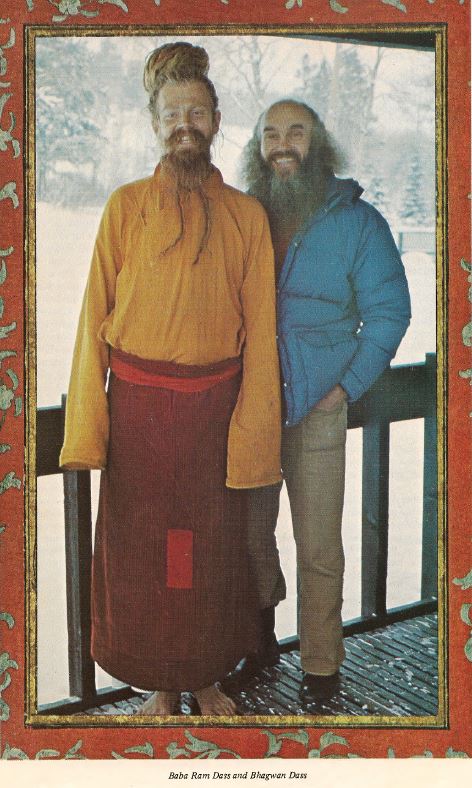
I was in the Blue Tibetan with my friend and these other people, and in walked this very extraordinary guy, at least extraordinary with regard to his height. He was 6’7″ and he had long blonde hair and a long blonde beard. He was a Westerner, an American, and was wearing holy clothes — a dhoti (a cloth Indian men wear instead of pants) and so on, and when he entered, he came directly over to our table and sat down.
Now, up until then, I had found this interesting thing that I don’t think I could have labeled until that moment. Once, when I had met Gesha Wangyal at Freehold, N.J., I knew I was meeting a being who “knew”, but I couldn’t get to it because I wasn’t ready, somehow. We were very close — we loved each other extraordinarily, but I hadn’t been able to really absorb whatever I needed to absorb. Now here was this young fellow and again, I had the feeling I had met somebody who “Knew”.
I don’t know how to describe this to you, except that I was deep in my despair; I had gone through game, after game, after game, first being a professor at Harvard, then being a psychedelic spokesman, and still people were constantly looking into my eyes, like “Do you know?” Just that subtle little look, and I was constantly looking into their eyes “Do you know’?” And there we were, “Do you’?” “Do you’?” “Maybe he …” “Do you …’?” And there was always that feeling that everybody was very close and we all knew we knew, but nobody quite knew. I don’t know how to describe it, other than that.
And I met this guy and there was no doubt in my mind. It was just like meeting a rock. It was just solid, all the way through. Everywhere I pressed, there he was!
We were staying in a hotel owned by the King or the Prince, or something, because we were going first class, so we spirited this fellow up to our suite in the Sewalti Hotel and for five days we had a continuing seminar. We had this extraordinarily beautiful Indian sculptor, Harish Johari, who was our guide and friend. Harish, this fellow, Bhagwan Dass and David and I sat there and for five days high on Peach Melbas and Hashish and Mescaline, we had a seminar with Alexandra David Neehl’s books and Sir John Woodroffe’s Serpent Power, and so on. At the end of five days, I was still absolutely staggered by this guy. He had started to teach me some mantras and working with beads. When it came time to leave, to go to Japan, I had the choice of going on to Japan on my first class route, or going off with this guy, back into India on a temple pilgrimage. He had no money and I had no money and it was going to change my style of life considerably. I thought. “Well, look, I came to India to find something and I still think this guy knows — I’m going to follow him.”
But there was also the counter thought, “How absurd — who’s writing this bizarre script. Here I am — I’ve come half-way around the world and I’m going to follow, through India, a 23 year old guy from Laguna Beach, California.”
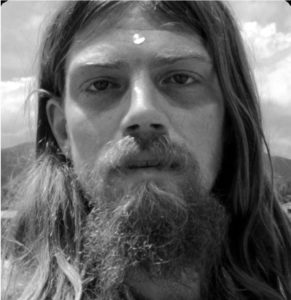
I said to Harish and to David, “Do you think I’m making a mistake?” And Harish said, “No, he is a very high guy.” And so I started to follow him — literally follow him.
Now I’m suddenly barefoot. He has said, “You’re not going to wear shoes, are you?” That sort of thing. And I’ve got a shoulder bag and my dhoti and blisters on my feet and dysentery, the likes of which you can’t imagine, and all he says is, “Well, fast for a few days.”
He’s very compassionate, but no pity.
And we’re sleeping on the ground, or on these wooden tables that you get when you stop at monasteries, and my hip bones ache. I go through an extraordinary physical breakdown, become very childlike and he takes care of me. And we start to travel through temples — to Baneshwar and Konarak and so on.
I see that he’s very powerful, so extraordinarily powerful — he’s got an ectara, a one-stringed instrument, and I’ve got a little Tibetan drum, and we go around to the villages and people rush out and they touch our feet because we’re holy men, which is embarrassing to me because I’m not a holy man — I’m obviously who I am — a sort of overage hippie, western explorer, and I feel very embarrassed when they do that and they give us food. And he plays and sings and the Hindu people love him and revere him. And he’s giving away all my money….
In progress
[pdf-embedder url=”https://beezone.com/wp-content/uploads/2021/01/Be-Here-Now.pdf” title=”Be Here Now”]